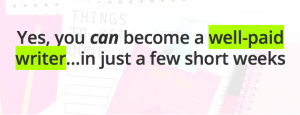Four Common Pieces of Writing Advice That Don’t Go Far Enough

These are four of the most frequently repeated pieces of writing advice. After over two decades working as a freelance writer, I can assure you they don’t go far enough. Here’s my take on how you can use each snippet of advice to really up your game, when it comes to producing a quality piece of writing.

Disclosure: Sometimes my work here (and all around the web) contains affiliate links. Find out what that means here.
Read
Reading is essential, but reading alone probably isn’t enough to make a writer out of you. For a start you need to read like a writer. Francine Prose has written an entire book on how to do this, Reading Like A Writer. When you read like a writer you don’t just read. You absorb, you analyse, you deconstruct. You write a quick ‘reaction paper’ when you read an article or essay that really speaks to you.
Years ago, when I was studying fiction writing, my writing tutor told me to read every novel twice. Once for pleasure, and once to analyse it. The first novel I read after that advice was Anne Tyler’s A Patchwork Planet. I was a good student, so the moment I had finished my ‘pleasure’ read, I flipped back to start my ‘analysis’ read. If I hadn’t, I might never have noticed that the last line in the book was exactly the same as the first: “I am a man you can trust.”
That was a lightbulb moment for me, as a writer and a storyteller. How often have I missed call backs, references, and literary echoes in the books I read? All the time, I would imagine. As a reader, does it really matter? Probably not. As a writer, it definitely does. A lot of the creative decisions we make as writers aren’t noticed by the reader, but that doesn’t mean they don’t make the reading experience more satisfying.
Write like nobody’s watching
More specifically, write like nobody’s reading. This is common advice, and it probably is a good idea to write like that to start with. It will help you get your ideas down in their purest, most uninhibited form. Publishing that writing in its rawest form, however? Probably not such a great idea.
Here’s the thing. People are going to be reading, eventually. And they may also be responding, commenting, and analysing what you’ve written. So write your first draft like nobody’s watching, then edit as though the piece will go viral.
You may have to defend your ideas, so make sure they are fleshed out, fact-checked and expressed in a way that can’t be misinterpreted. You’ll get trolls in the comment section sometimes, when you write online. That’s mostly about them, and not necessarily a reflection of your writing. Just be prepared for them, especially when you write something contentious.
Write like you talk
This is common advice, especially when writing for an online audience. Conversational, informal, flowy writing is what’s expected of online writers. What you actually want to do, though, is write like you wish you talked. Write like the best, wittiest, most articulate version of yourself.
Being a writer allows you to be the version of yourself you’d like to be (but rarely are) at a social gathering. It allows you to reflect on all the issues, and put together a beautifully thought out, balanced, intelligent argument. It allows you to anticipate criticisms and address them in advance. It allows you to defend, and support with evidence, the views that challenge the status quo. Don’t waste the opportunity.
As an aside, if you do attract a few trolls into your comment section, don’t fire off a hasty reply. They’ll generally be looking for an argument. Take your time, then choose to rebuff them with an intelligent and articulate response, or frustrate the hell out of them by not responding at all (both can be fun).
Let it sit
You always need a break between writing and editing, but many writers don’t take enough of a break. I’m guilty of this myself. If I finish an article just before my tea break, I’ll go back and edit it while I‘m still draining my mug.
As a busy, working freelance content writer, that’s often necessary, but it’s not ideal. The best writing comes from writing, taking a break, editing, taking a break, editing some more, then taking a long break and doing a final, detail-focused proofread.
If you’re a writer who publishes internet content directly, without the benefit of putting your work through an editing process, you might want to consider a proofreading course. Don’t expect miracles though. I took a proofreading course. I even work as a proofreader. And my directly published work is rarely perfect. In writing, as in life, other people’s mistakes are easier to spot than our own.
One last tip…
There’s a lot more advice like this out there. It’s not a bad habit to put your critical thinking cap on. Whenever you hear a short snippet of writing advice, think about how you can drill a little deeper. There’s usually a stronger, better, more specific message behind the surface advice. See if you can work out what it is.
Originally published on The Partnered Pen.
*****
Struggling to make your first $1000 from freelance writing? Check out the Write Your Way To Your First 1K course.
While you’re here, don’t forget to grab your FREE list of freelance markets that pay writers.
You might also like the writing section over at my Amazon store.






Christina Henry
December 22, 2020
I found this very interesting and useful. Thankyou
.
Casey Botticello
January 12, 2021
Great stuff as always, Karen!